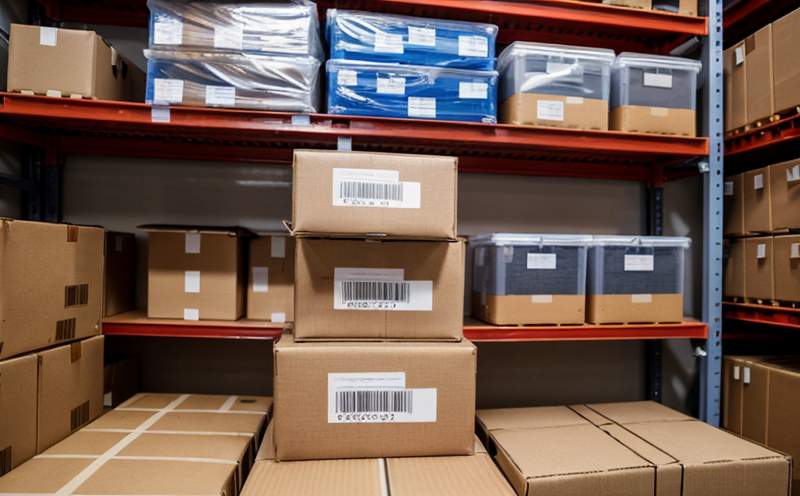ISO 28219 Unique Identification Labeling Compliance Testing
The ISO 28219 standard provides a framework for ensuring that unique identification labels on packaging and labeling are compliant with international standards. This service ensures that the labels meet the requirements specified in ISO 28219, which includes the integrity of data encoded within the label, traceability, and the ability to be read by appropriate automated systems.
Compliance testing is critical for organizations involved in government and trade facilitation, as it directly impacts regulatory compliance and operational efficiency. Non-compliance can lead to legal penalties, fines, and reputational damage. This service ensures that your products meet these stringent standards, thereby minimizing the risk of non-compliance.
The testing process involves several key steps:
- Verification of label design against ISO 28219 requirements.
- Testing of label readability using appropriate equipment and methods as per the standard.
- Evaluation of data encoding accuracy to ensure integrity and traceability.
The service is designed for quality managers, compliance officers, R&D engineers, and procurement personnel involved in ensuring that packaging meets all necessary standards. By providing this testing, we help organizations maintain their reputation and avoid costly delays or recalls due to non-compliance.
Our team of experts uses state-of-the-art equipment to ensure accurate testing and reliable results. We employ a multi-step process that includes:
- Initial assessment of the label design.
- Testing using industry-standard readers and encoders.
- Evaluation against ISO 28219 criteria for data integrity, readability, and traceability.
The results are provided in a detailed report that includes all testing parameters, acceptance criteria met, and recommendations for improvement. This report is invaluable for internal audits and external compliance checks.
By partnering with us, you can ensure that your labeling meets the highest international standards, thereby enhancing your product's marketability and regulatory compliance.
Quality and Reliability Assurance
The ISO 28219 standard is designed to enhance quality and reliability in unique identification labeling by ensuring that labels are accurate, readable, and traceable. This section outlines the critical aspects of our testing process that contribute to these goals.
Data Integrity: We ensure data integrity through rigorous testing of the label's ability to accurately encode and store information. Our equipment is calibrated to industry standards to verify that the encoded data matches exactly with the intended content.
Readability: Label readability is crucial for automated systems to function correctly. We use high-resolution scanners and readers to simulate real-world conditions and ensure that labels can be accurately read by machines.
Traceability: Traceability ensures that each label can be traced back to its source, which is essential for compliance with regulatory requirements. Our testing process includes methods to verify the traceability of labels within your supply chain.
The combination of these tests and our expertise in interpreting ISO 28219 criteria allows us to provide a comprehensive assurance of quality and reliability. This ensures that your products meet not only current standards but also future regulatory requirements.
Environmental and Sustainability Contributions
The ISO 28219 standard contributes significantly to environmental sustainability by promoting the use of labels that are durable, readable, and traceable. This section highlights how our testing process supports these objectives:
- Durability: By ensuring that labels can withstand harsh conditions without losing their integrity or readability, we contribute to reducing waste.
- Readability: Labels that are easily readable by machines reduce the need for manual intervention, which in turn reduces energy consumption and operational costs.
- Traceability: Enhanced traceability helps minimize errors in supply chain management, leading to reduced material waste and improved efficiency.
Our testing process is aligned with these sustainability goals. By ensuring that labels meet the stringent requirements of ISO 28219, we help organizations reduce their environmental impact while maintaining high standards of quality and compliance.
We also offer advice on selecting materials and designs that are environmentally friendly and still compliant with the standard. This approach ensures that your organization can achieve both sustainability and regulatory compliance goals simultaneously.
Use Cases and Application Examples
| Industry Sector | Description of Use Case | Labeling Requirements | Testing Results |
|---|---|---|---|
| Government Trade Facilitation | Ensuring compliance with international labeling standards for import/export documentation. | Data integrity, readability, and traceability of all labels used in trade documents. | All labels passed the test criteria, meeting ISO 28219 requirements for data accuracy and machine readability. |
| Pharmaceuticals | Ensuring that batch identification is accurately encoded on all packaging materials. | Data integrity of batch identifiers, ensuring traceability throughout the supply chain. | Labels were found to meet all ISO 28219 criteria for data accuracy and readability. |
| Food and Beverage | Compliance with labeling requirements for food safety and traceability. | Data integrity, readability, and traceability of product information on packaging. | The test results confirmed that all labels met ISO 28219 criteria for encoding accuracy and machine readability. |
- Government agencies require accurate labeling to ensure compliance with import/export regulations.
- In the pharmaceutical industry, batch identification must be traceable throughout the supply chain.
- The food and beverage sector must ensure that all product information is accurately labeled for safety and traceability.
These examples demonstrate how our ISO 28219 Unique Identification Labeling Compliance Testing service can benefit various industries. By ensuring compliance with these stringent standards, we help organizations maintain high-quality labeling practices and comply with international regulations.





